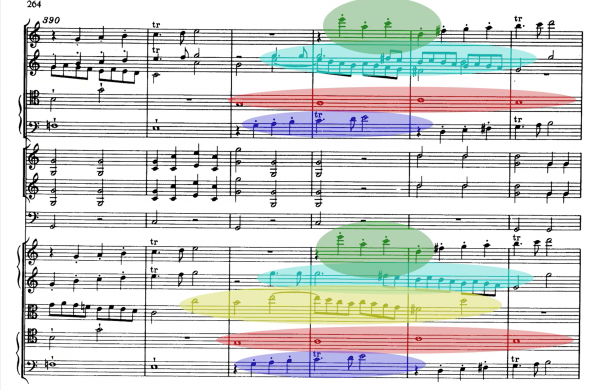Mozart: Pure Genius

If a genius IQ score is around 140 to 145 or higher, then about 0.25% of the population can be considered to be a genius. That's about 1 in 400 people. So, at least in theory, there are a lot of geniuses around. For example, statistically, there would be 44 geniuses at a hockey game. Impressive, but I don't think they hold a candle to real genius. For starters, although they might be smart, few of them can produce works that manifestly demonstrate their genius. Which brings us to Mozart.
As noted, it is a cliche to say that Mozart was a genius. Along with Einstein and a few others, that goes without saying. But exactly why do we say he was a genius? We can tap our feet to his tunes, but do we have to be musicologists to understand what it is about his music that gets him into the most elite of clubs?
Yes, a musicologist could explain it to us, but this YouTube video, The Greatest 30 Seconds of Classical Music, is probably more succinct. Please, take a look at it. You will see the nuts and bolts, the sinews and muscles, the notes and staves of genius at work. Right there, in half a minute, Mozart blows the doors off anyone else who has presumed to write music.
After watching the video, I hope there was a smile on your face. Not surprising – there is nothing more pleasing that seeing a job well done, and I mean – really well done. The question is – why? Why compose something so complex? So musically sophisticated? He knew that the intricacies of his work would go right over the heads of his patrons and his powdered-wig audiences. At best, he probably figured that his works would be performed once or twice, then discarded. He could never have imagined that two centuries later we would listen in awe.
So – why? Perhaps he was writing for his fellow Viennese composers and players in the orchestra who would appreciate his craftsmanship. Or perhaps he instinctively knew that on a subconscious level, people's brains would be tickled by the complexity. Without ever knowing how he achieved it, they would be delighted with his work. Alternatively, maybe the complexity was merely for his personal satisfaction – for his own amusement.
My theory is this: when he wrote this, or the hundreds of hours of his genius-level music, the ideas of artistry or genius never occurred to him. He was just writing down the music that played in his head. To him, it was just the way music should be composed. It was the only way he knew how to write music. For Mozart, music was a means of expression that was something far different than anything we can express, or even fully appreciate. At best, we can stand out on the sidewalk, our ears pressed against the window, hearing a small part of what he was hearing. After all, it is said that genius lives among us, but not with us.
Mozart composed the Jupiter Symphony, his last symphony, in about two weeks. I imagine him scribbling down this brief section pretty much as fast as he could scribble. He probably didn't even think about it. He just wrote it. A high point of Western culture – just another day at the pianoforte for a 32-year old genius, operating on a whole 'nother level.
Postscript: According to Wikipedia, the Jupiter Symphony was probably composed for a concert series Mozart was planning. Historians have not determined whether the concert series was held, or was canceled for lack of interest.





























































